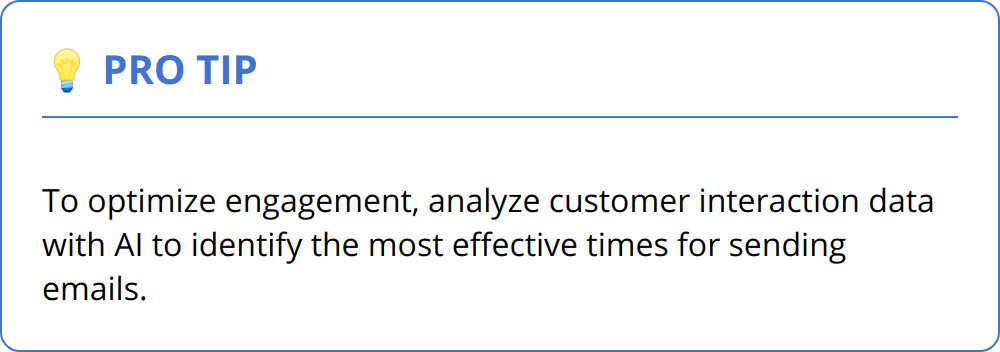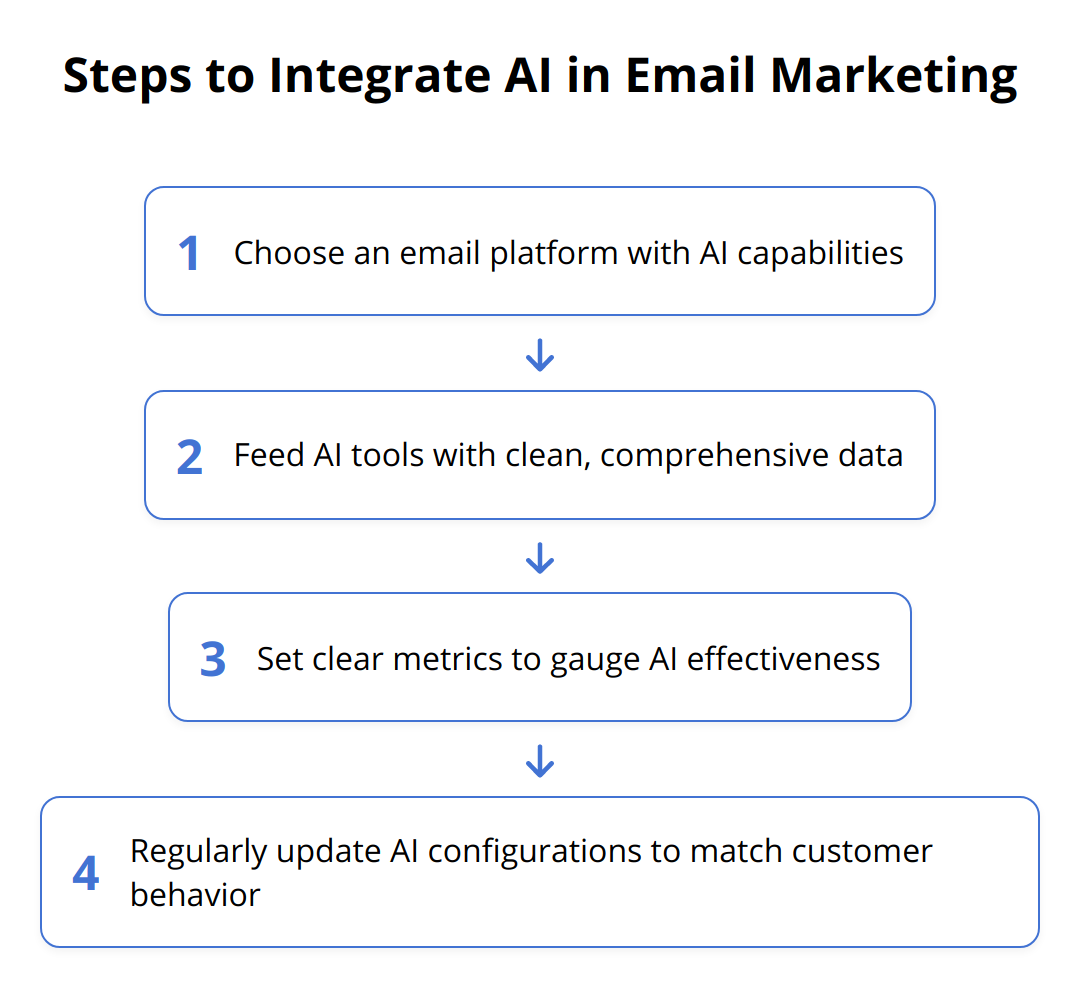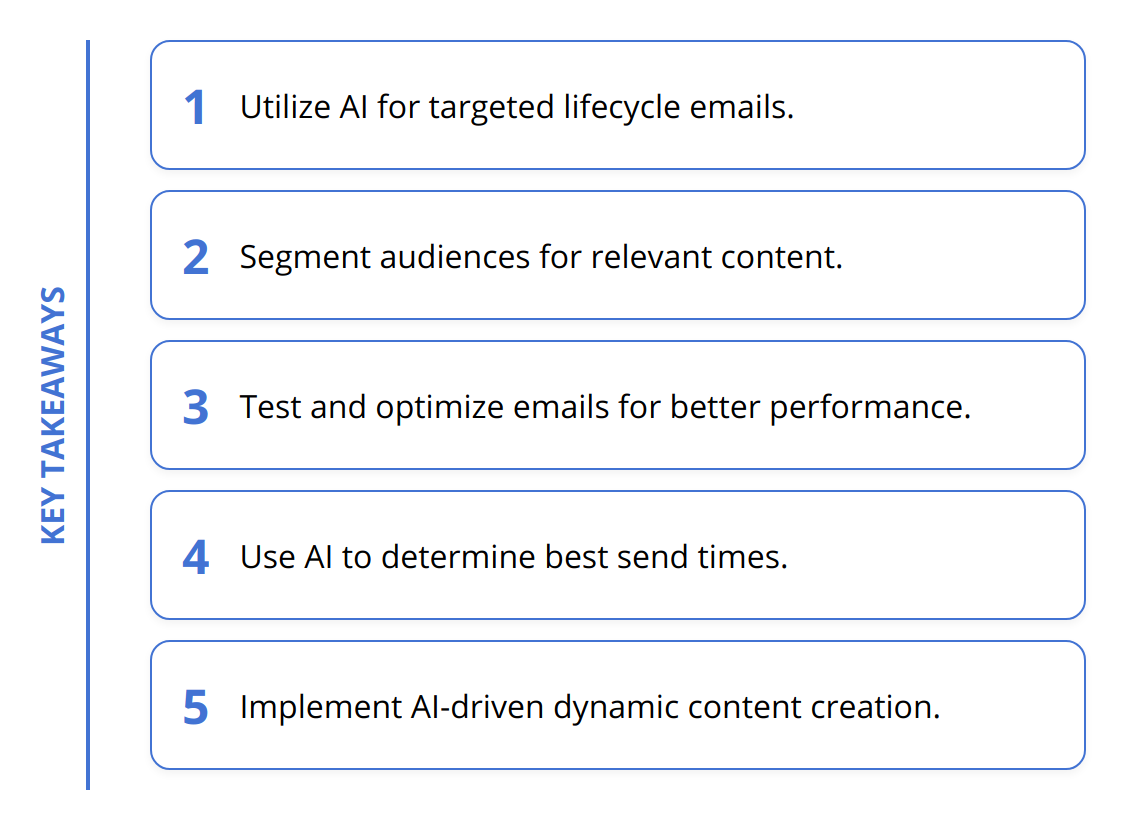Email marketing’s evolution has been spectacular, effortlessly adapting to the ever-changing digital landscape. This transformation is heavily influenced by artificial intelligence (AI), which is steadily reshaping how we approach lifecycle email marketing.
We at Emplibot recognize that personalizing the customer journey is no longer a luxury, but a necessity for businesses aiming to thrive. Read on to grasp the essentials of implementing AI in your email strategy and the substantial benefits it promises for future-proofing your marketing efforts.
Crafting Emails for the Customer Journey
Understanding the nuances of lifecycle email marketing is pivotal for businesses. Essentially, it’s about sending the right message to the right person at the right time. Every interaction with a customer is an opportunity to reinforce your brand, offer value, and guide them to the next stage of their journey.
In lifecycle marketing, the customer journey is the road map outlining all potential interactions someone could have with your brand, from the first touchpoint to post-purchase engagement. At each stage, customers have different needs and expectations. It’s a marketer’s job to identify these and craft email communications that speak directly to those needs.

Email marketing plays a dual role here: it both informs and nudges. Smartly designed emails can teach users about your offerings when their interest is peaking and gently push them towards a purchase when they’re considering options. And after the sale, email is the perfect channel for keeping that conversation going, encouraging repeat business, and fostering loyalty.
Here’s why embedding email marketing into the lifecycle is powerful:
-
It helps build relationships. Tell a story about your brand and provide content that’s relevant to where your customer is in their journey.
-
It drives conversions. Tailored offers can trigger purchases just when the customer is ready to buy.
-
It increases retention. Post-purchase emails, when done right, can turn happy customers into brand advocates.

Let’s look at some practical steps you can take:
-
Analyze the data. Understand where your customers are dropping off and tailor your emails to address their hesitations.
-
Segment your audience. Not everyone is at the same stage; ensure your content is relevant to each segment’s journey stage.
-
Test and optimize. Keep a close eye on metrics like open rates and conversions, and adjust your emails to improve performance.
For example, a company selling fitness equipment might send motivation-themed emails early in the customer’s journey, followed by product features and comparisons at the consideration stage, and eventually how-to guides post-purchase to keep customers engaged.
For further reading on segmentation strategies, consider our insights on segmentation strategies in marketing automation.
Email marketing remains a powerhouse in the digital age because it adapts and grows with technology. By enhancing it with AI which can predict customer behavior, personalize content dynamically, and automate timing, you’re not just shooting emails out and hoping for the best; you’re engaged in a strategic, data-driven dance with your customers. And they’re more likely to stay on the dance floor if you’re in step with their rhythm.
To unleash the full potential of lifecycle email marketing, integrate AI to help interpret customer data, predict their next steps, and create a richer, more cohesive customer journey. With these insights, businesses can leverage each and every touchpoint, carving out a competitive edge by providing exactly what the customer needs, exactly when they need it.
AI-Powered Personalization
Email marketing’s effectiveness soars when each message feels like a conversation between your brand and a single recipient. This is the power of AI-driven personalization — it’s like having a dedicated marketer for every customer, understanding their preferences and behaviours, and tailoring communications in real-time.
Trust is pivotal in any relationship, including the digital one between a brand and its customers. When an email resonates personally, it strengthens trust, and this is where AI shines. By analyzing vast amounts of customer data, AI spots trends and patterns to deliver highly relevant content, tailored to individual needs and preferences. Using AI, you can ensure each subscriber feels seen and valued by your brand.

Actionable data insights allow you to create emails that engage and convert. For instance, if analytics show a segment of your customers are frequently purchasing eco-friendly products, AI can customize email campaigns to highlight your brand’s sustainability efforts or recommend eco-friendly product lines specifically to those customers.
Powerful AI tools can sift through customer data and previous interactions to generate content recommendations that resonate on a personal level. When customers receive emails with content they care about, click-through rates can increase significantly. Emplibot offers insights on engaging customers with content that are worth exploring.
Next, consider predictive analytics for timing and content. The success of lifecycle email marketing hinges not just on what you say, but when you say it. AI can predict the optimal time to send emails based on individual customer behaviors, thus increasing the likelihood that they’ll be opened, read, and acted upon.
Automated trigger-based emails take customer engagement to the next level. Whether it’s a welcome email, a cart abandonment reminder, or a renewal notice, trigger-based campaigns leverage AI to interact with customers based on their actions in real time. This not only saves time but also maintains a steady drumbeat of communication that keeps your brand top-of-mind.

Some quick tips:
-
Implement AI for dynamic content creation in emails, adjusting messages based on real-time data.
-
Use AI to determine the best sending frequency for each customer, avoiding over or under-communication.
-
Enhance your subject lines with AI, using language that has been statistically shown to improve open rates.
-
Personalize product recommendations with AI, based on browsing and purchase history for up-sale and cross-sale opportunities.
For marketers intent on staying at the forefront, integrating these AI applications is essential. It transforms the email from a mere marketing tool into a robust, engaging experience that drives real business value.
Harnessing AI for Email Strategy
Leveraging AI in your email marketing approach isn’t just about staying current, it’s about being proactive and predictive. When AI is seamlessly meshed with your email tools, the outcome is a smarter, more efficient strategy tailored to individual needs. To realize the full potential of AI, begin by integrating intelligent mechanisms with your existing email platforms. This means choosing the right tools and setting up your campaigns to smartly adapt based on the data AI provides.
The integration of AI with your email platform is a game-changer. Platforms that enable AI functionalities can automate routine tasks, freeing your team to focus on strategy and creative development. Ensure that your choice of an email marketing platform has the capability to support AI-based plugins or built-in features. This is not a one-size-fits-all endeavor; some businesses may benefit more from AI tools that focus on segmentation while others might need advanced predictive analytics.
Setting up AI-driven email campaigns involves a precise blend of creativity and machine precision. Start by feeding your AI tools with quality data. The insights garnered from AI are only as good as the data it processes. This where your own diligence in data collection and clean-up processes pays off. With rich data, AI can accurately predict customer preferences, optimize send times, and even refine your campaign’s subject lines and content.
While measuring the impact of AI on your email performance, it is essential to establish clear metrics for success beforehand. Look beyond open rates and click-through rates. Consider engagement metrics like email forwards, social shares, and conversion rates pre and post AI integration. Remember, the goal here is not just incremental improvement but transformative results that resonate with your customers.

Here are actionable steps to streamline AI into your email marketing framework:
-
Ensure your chosen email platform can integrate seamlessly with AI capabilities.
-
Feed your AI systems with clean and comprehensive data for accurate insights.
-
Define clear metrics to gauge the AI’s effectiveness in driving key performance indicators.
-
Regularly revisit your AI configurations to align with evolving customer behaviors and preferences.
For further details on how to analyze your marketing campaigns, our guide on analyzing marketing automation data can serve as a helpful resource.
Remember, AI is not about replacing the marketer’s touch, but about augmenting it. Strategic layering of AI within email marketing workflows can offer personalization at scale, efficiency in segmentation, and precision in timing, resulting in a harmonious balance that propels your email campaigns forward.
In the next chapter, we will explore how to maintain a human touch while utilizing AI to enhance your email marketing strategy. Stay with us to uncover the methods of humanizing technology-driven campaigns for maximum effect.
Final Thoughts
As we reach the end of our exploration of AI in lifecycle email marketing, it’s clear that embrace of this technology offers strategic advantages for businesses. AI is changing the game by providing personalization at an unprecedented scale, tailoring communication to meet customers’ needs at every step of their journey, and doing so with remarkable efficiency. Here are key takeaways to remember:

-
AI transforms email marketing into a dynamic dialogue, elevating each interaction from routine to remarkable.
-
Intelligent automation leads to better engagement and higher conversion rates by ensuring timely and relevant communication.
-
Personalization powered by AI doesn’t just aim for the inbox; it seeks to engage the individual, making each message resonate more profoundly.
Looking ahead, the future of AI in email marketing seems poised for growth and innovation. We can expect to see:
-
Greater integration of machine learning, further refining personalization, and customer insights.
-
Advancements in natural language processing, enhancing the nuanced understanding of subscriber responses.
-
More sophisticated predictive analytics, driving improved customer retention and loyalty programs.
Marketers must stay ahead of the curve by adopting and mastering these tools to maintain a competitive edge. However, even as technology evolves, we must keep the human touch in our narrative; linking data-driven insights with genuine relationship-building is the hallmark of successful lifecycle marketing.
Emplibot is a prime example of how AI can support your digital marketing strategy. By automating complex processes such as SEO-friendly content creation and keyword research, Emplibot frees your team to focus on the creative and strategic elements of marketing that AI is yet to replicate.
For those ready to harness the potentials of AI in their marketing strategies, these steps are essential:
-
Invest in AI tools that align with your business goals and customer journey.
-
Embrace ongoing learning and training to use AI effectively.
-
Stay informed about AI developments and updates in email marketing practices.
Encouraging the adoption of AI in lifecycle email marketing should be more than a trend—it’s a forward-thinking move that positions your brand to stay relevant, responsive, and relational. By leveraging key AI applications, every email becomes an opportunity to deepen the customer relationship and drive tangible business results.
As we part ways, it’s worth noting that when AI is employed strategically, it has the potential to be the most impactful team member in your marketing department. Explore how you can strengthen your own marketing automation with Emplibot’s unique abilities and take confident strides into the future of digital engagement. For more insights on effectively leveraging AI, examine AI marketing trends.
In conclusion, AI is not just a futuristic concept but a present-day ally in crafting compelling, customer-centric email campaigns. Its prowess lies in understanding and interacting with your audience in ways that were previously unthinkable. If there’s ever a time to start integrating AI into your email marketing strategy, it’s now.

